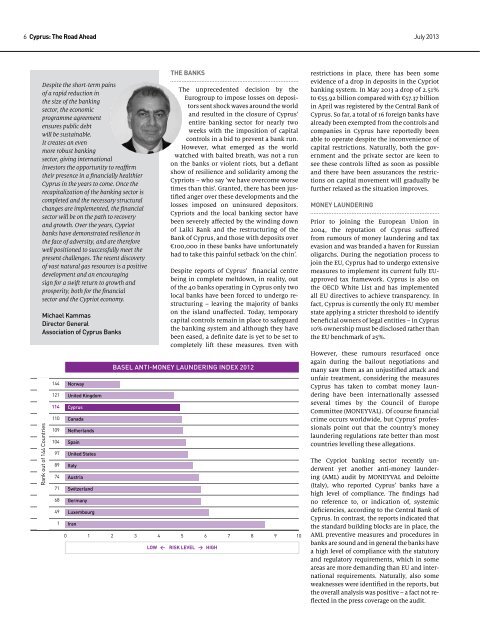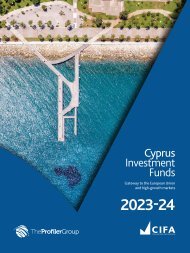Cyprus The Road Ahead July 2013
Create successful ePaper yourself
Turn your PDF publications into a flip-book with our unique Google optimized e-Paper software.
6 <strong>Cyprus</strong>: <strong>The</strong> <strong>Road</strong> <strong>Ahead</strong> <strong>July</strong> <strong>2013</strong><br />
Despite the short-term pains<br />
of a rapid reduction in<br />
the size of the banking<br />
sector, the economic<br />
programme agreement<br />
ensures public debt<br />
will be sustainable.<br />
It creates an even<br />
more robust banking<br />
sector, giving international<br />
investors the opportunity to reaffirm<br />
their presence in a financially healthier<br />
<strong>Cyprus</strong> in the years to come. Once the<br />
recapitalization of the banking sector is<br />
completed and the necessary structural<br />
changes are implemented, the financial<br />
sector will be on the path to recovery<br />
and growth. Over the years, Cypriot<br />
banks have demonstrated resilience in<br />
the face of adversity, and are therefore<br />
well positioned to successfully meet the<br />
present challenges. <strong>The</strong> recent discovery<br />
of vast natural gas resources is a positive<br />
development and an encouraging<br />
sign for a swift return to growth and<br />
prosperity, both for the financial<br />
sector and the Cypriot economy.<br />
Michael Kammas<br />
Director General<br />
Association of <strong>Cyprus</strong> Banks<br />
Rank out of 144 Countries<br />
144<br />
121<br />
114<br />
110<br />
109<br />
104<br />
97<br />
89<br />
74<br />
71<br />
68<br />
49<br />
1<br />
Norway<br />
United Kingdom<br />
<strong>Cyprus</strong><br />
Canada<br />
Netherlands<br />
Spain<br />
United States<br />
Italy<br />
Austria<br />
Switzerland<br />
Germany<br />
Luxembourg<br />
Iran<br />
<strong>The</strong> Banks<br />
<strong>The</strong> unprecedented decision by the<br />
Eurogroup to impose losses on depositors<br />
sent shock waves around the world<br />
and resulted in the closure of <strong>Cyprus</strong>’<br />
entire banking sector for nearly two<br />
weeks with the imposition of capital<br />
controls in a bid to prevent a bank run.<br />
However, what emerged as the world<br />
watched with baited breath, was not a run<br />
on the banks or violent riots, but a defiant<br />
show of resilience and solidarity among the<br />
Cypriots – who say ‘we have overcome worse<br />
times than this’. Granted, there has been justified<br />
anger over these developments and the<br />
losses imposed on uninsured depositors.<br />
Cypriots and the local banking sector have<br />
been severely affected by the winding down<br />
of Laiki Bank and the restructuring of the<br />
Bank of <strong>Cyprus</strong>, and those with deposits over<br />
€100,000 in these banks have unfortunately<br />
had to take this painful setback ‘on the chin’.<br />
Despite reports of <strong>Cyprus</strong>’ financial centre<br />
being in complete meltdown, in reality, out<br />
of the 40 banks operating in <strong>Cyprus</strong> only two<br />
local banks have been forced to undergo restructuring<br />
– leaving the majority of banks<br />
on the island unaffected. Today, temporary<br />
capital controls remain in place to safeguard<br />
the banking system and although they have<br />
been eased, a definite date is yet to be set to<br />
completely lift these measures. Even with<br />
Basel Anti-Money Laundering Index 2012<br />
0 1 2 3 4 5 6 7 8 9 10<br />
low ← Risk Level → high<br />
restrictions in place, there has been some<br />
evidence of a drop in deposits in the Cypriot<br />
banking system. In May <strong>2013</strong> a drop of 2.51%<br />
to €55.92 billion compared with €57.37 billion<br />
in April was registered by the Central Bank of<br />
<strong>Cyprus</strong>. So far, a total of 16 foreign banks have<br />
already been exempted from the controls and<br />
companies in <strong>Cyprus</strong> have reportedly been<br />
able to operate despite the inconvenience of<br />
capital restrictions. Naturally, both the government<br />
and the private sector are keen to<br />
see these controls lifted as soon as possible<br />
and there have been assurances the restrictions<br />
on capital movement will gradually be<br />
further relaxed as the situation improves.<br />
Money Laundering<br />
Prior to joining the European Union in<br />
2004, the reputation of <strong>Cyprus</strong> suffered<br />
from rumours of money laundering and tax<br />
evasion and was branded a haven for Russian<br />
oligarchs. During the negotiation process to<br />
join the EU, <strong>Cyprus</strong> had to undergo extensive<br />
measures to implement its current fully EUapproved<br />
tax framework. <strong>Cyprus</strong> is also on<br />
the OECD White List and has implemented<br />
all EU directives to achieve transparency. In<br />
fact, <strong>Cyprus</strong> is currently the only EU member<br />
state applying a stricter threshold to identify<br />
beneficial owners of legal entities – in <strong>Cyprus</strong><br />
10% ownership must be disclosed rather than<br />
the EU benchmark of 25%.<br />
However, these rumours resurfaced once<br />
again during the bailout negotiations and<br />
many saw them as an unjustified attack and<br />
unfair treatment, considering the measures<br />
<strong>Cyprus</strong> has taken to combat money laundering<br />
have been internationally assessed<br />
several times by the Council of Europe<br />
Committee (Moneyval). Of course financial<br />
crime occurs worldwide, but <strong>Cyprus</strong>’ professionals<br />
point out that the country’s money<br />
laundering regulations rate better than most<br />
countries levelling these allegations.<br />
<strong>The</strong> Cypriot banking sector recently underwent<br />
yet another anti-money laundering<br />
(AML) audit by Moneyval and Deloitte<br />
(Italy), who reported <strong>Cyprus</strong>’ banks have a<br />
high level of compliance. <strong>The</strong> findings had<br />
no reference to, or indication of, systemic<br />
deficiencies, according to the Central Bank of<br />
<strong>Cyprus</strong>. In contrast, the reports indicated that<br />
the standard building blocks are in place, the<br />
AML preventive measures and procedures in<br />
banks are sound and in general the banks have<br />
a high level of compliance with the statutory<br />
and regulatory requirements, which in some<br />
areas are more demanding than EU and international<br />
requirements. Naturally, also some<br />
weaknesses were identified in the reports, but<br />
the overall analysis was positive – a fact not reflected<br />
in the press coverage on the audit.
















